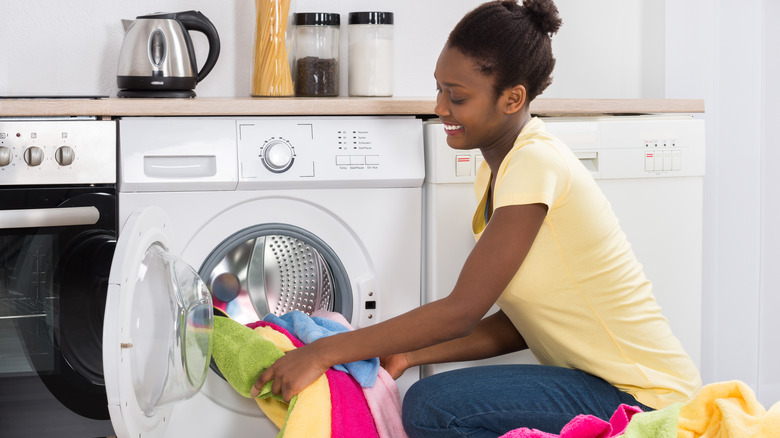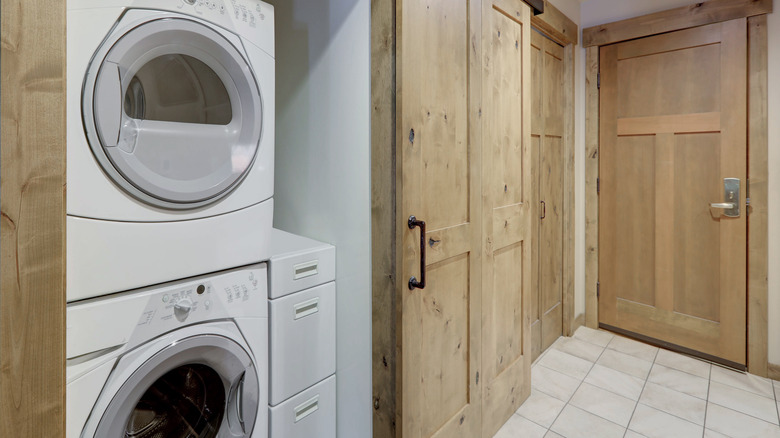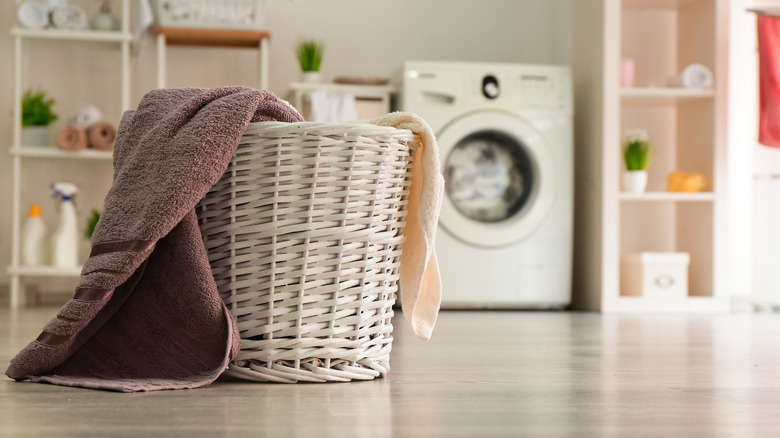How Much Does It Cost To Get A New Washer And Dryer?
Finding the perfect washer and dryer for your home and budget can be stressful, but it's infinitely preferable to driving down to the laundromat every time you need clean laundry. As with most home appliances, the cost of a new washer and dryer will largely depend on the size, features, and design of the models you have your eye on. Keep in mind that some washers and dryers may save you some cash in the long run if you invest in energy-efficient models that are built to withstand the test of time.
According to Kitchens.com, purchasing a new washer will likely set you back between $250 and $2,050 while a dryer will cost around $200 to $1,750, depending on its features. Of course, there is a world of difference between a compact, gas-powered top-load washer and a state-of-the-art, Energy Star front-load washer with a capacity to meet the demands of a large family. For this reason, breaking down the differences in costs between specific styles of washers and dryers will give you the best idea of the price you may pay when you're standing in the checkout line at the store.
Space-saving washers and dryers
If floor space is at a premium where you do your laundry, you might consider purchasing a stackable washer and dryer. Stackable units are often considerably more affordable than fixed stacked washers and dryers, with an average price of $500 to $1,500, as pointed out by Fixr. On the other hand, if you prefer a stacked washer and dryer, you could pay up to $3,000, depending on the appliances' capacity, materials, and features.
Anyone seriously limited on space in their laundry room may find a combo washer and dryer to be an enticing option. These units usually take up roughly the same amount of space as a single washer and dryer but work double duty for all of your washing and drying needs. According to Fixr, they usually sell for around $1,000 to $2,500, so a combo unit will likely be more affordable than many washers and dryers when purchased separately. However, combo units use a surprising amount of water (per Cleancult), so don't be shocked if your utility bill goes up after you install your new appliance.
Size and features
The capacity of a washer and dryer is one of the biggest factors that will determine their cost. However, if you assume that a smaller capacity always means a cheaper price tag, you might be disappointed. According to Fixr, full-size washers and dryers are often the most affordable option for homeowners, with an average combined cost of $700 to $2,200. When compared to the average price range for compact models ($500 to $3,000) and high-capacity washers and dryers ($1,600 to $3,800), you can see that the high-end, full-size appliances will likely save you some cash versus compact or high-capacity models with comparable features.
Whether a washer sports a front-load or top-load design will also influence its price tag. Front-load washers are usually more expensive than comparable top-load models (per Overstock), but can usually cut down on your drying time thanks to their super-charged spin speeds. Budget-savvy homeowners might also consider an energy-efficient top-load washer. While these cost more than traditional top-load models, they can save you money over time on your water and energy bills.
Other considerations
According to Fixr, even the color or finish of your washer and dryer can influence the price you pay. For this reason, expect to pay far less for a low-end white washer and dryer than comparable models with a chrome finish. If you are looking at two nearly identical products in different colors and are wondering why one is so much more expensive, it might just be a matter of color.
When shopping for a dryer, choosing between a gas or electric model can also require a serious cost-benefit analysis. According to Overstock, gas dryers will likely cost less than electric models to operate over time. This is, of course, if your home has a natural gas setup and an external exhaust vent in your laundry room. On the other hand, you can likely save $100 dollars in up-front costs by opting for an electric dryer. However, these usually aren't as energy efficient as gas dryers and may end up costing you more in the long run due to the cost of electricity.



